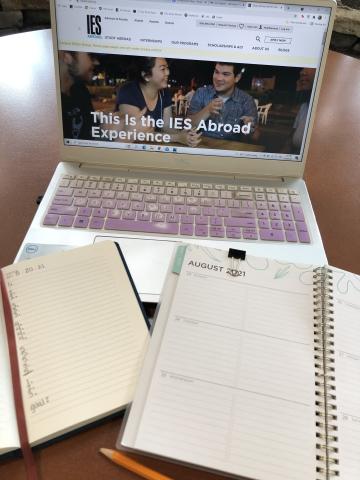
If you’re anything like me, you might be spending countless hours running over what-ifs and possible scenarios of what to expect from your trip abroad. My mind is muddled, at this point. My emotions fluctuate with every new thought, worry, concern, or hope about my experience. In a time that should be pure excitement, I’m mentally drained with few helpful outlets.
Recently, I realized the happiness of almost embarking on my journey overshadowed my fears. I know if I procrastinate enough, I can ignore them. But I also know, whether overthinking or putting off, the balance of my mental and emotional wellbeing is impacted if I don’t address my thoughts and feelings about going abroad.
My focus thus far has been outward. Prepping for my trip, packing, collecting travel documents, and making lists has taken precedence over my mental health. Obviously planning my outfits abroad is a must, but my attention has been directed on my future so much so it’s a distraction from the present. With less than a week before I leave, I’m realizing a majority of my fears come not as much from what I might forget to pack, but how my mental wellbeing will be impacted after juggling such rapid changes.
My goal was always to get abroad, so my focus has been on completing tasks to accomplish that. But what about personal growth? What about healthy habits? Goal setting? How do I protect my mental state without being too preoccupied with all the Netherlands offers?
Maybe you feel similarly, which is why I’m sharing some valuable practices that center personal development tips to navigate the intricate and ever-changing questions about life abroad. In the end, you’ll be able to cultivate meaningful, well-contemplated, and calculated actions around your goals following these methods.
1. Play the “Why” Game
Questioning my thoughts, habits, and goals revolves around a simple practice of asking myself “why?” Here’s how I do it. First, I start by creating a question or statement about my thoughts or feelings.
Q/S: “I am nervous about how to continue my self-care practices abroad.” Then I ask why.
A: “I’m concerned because my mental health is valuable, and I fear that if I don’t have healthy habits, I will react negatively to experiencing culture shock.”
Q: “Why?”
A: “I struggle to maintain mindful practices as is, and I know that culture shock is a very real experience that could lead me to shut down without proper coping mechanisms.”
Q: “Why?”
It gets a bit harder each time because every answer requires delving deeper and assessing from where concerns derive. After at least five answers, I move on.
The length of my answers typically vary from a few thoughtful sentences to internal monologues, but what matters more than length is whether your answers are of quality to you. It can be as time consuming as you allow it to be, and by the end what you gain is essential insight that shapes your actions moving forward.
This repetitive practice turns curiosity inward, offering a judgement-free space. It also provides a new example of self-expression and communication, which I utilize as a daily practice to challenge my knowledge frameworks. It’s calming and requires attention to my deepest feelings and how they manifest. Each part of the process is a reflection of being in touch with myself.
Remember, reflection is an active process that can help you assess your goals while studying abroad. It has relieved so much stress for me, and it will be a practice I continue as new things come up for me when I finally reach Amsterdam!
Now I want to offer advice for how to shape what you discover from playing the “why” game into healthy habits and goals!
2. Goal Setting
If I’m being honest, I can be pretty lazy. Netflix in bed is enticing whether at home or abroad (I know you agree, there’s no shame). Already, goal setting at home is a challenge, so thinking about my goals abroad overwhelms me. I’ve turned to investing in methods that encourage me to dive into different areas of my life to assess my wants. Here are some areas I focus on for self-improvement:
- Personal
- Academic
- Professional
- Physical
- Spiritual
- Emotional
- Pleasure
- Artistic
- Interpersonal
With this list as a guiding point, let’s examine how to construct goals that fit into various areas of your lifestyle.
I utilize the S.M.A.R.T. method. It’s a mnemonic device that stands for:
S - Specific or Significant
M - Measurable or Meaningful
A - Attainable or Action-Oriented
R - Relevant or Rewarding
T - Time Bound or Trackable
Check out https://www.mindtools.com/page6.html for details!
The S.M.A.R.T. technique would turn an academic goal such as “I want B’s in all my classes” to something like, “I will study in the library one hour a day for each class to maintain B’s.”
Physical Goal: “I want to do yoga abroad.” ---> “I will spend 15 minutes a day practicing yoga either online or in the studio.”
Interpersonal Goal: “I will network abroad.” ---> “I will talk to at least one new person each day when I go out to learn Dutch social norms.”
Pleasure Goal: “I will read more.” ---> “I will read at least one chapter each night before bed instead of being on social media.”
Setting goals is a crucial element of personal growth. It motivates your wants and allows you to center what you value most. I find that both the practice of setting goals and working towards them have a positive benefit on my mental wellbeing because I feel accomplished when I work to better myself.
I’ve learned that creating long term goals for my experience abroad grounds me. However, I’ve discovered that if I only think long term, I lose guidance on what steps I need to reach the end point. I find setting daily goals to be a more successful practice for myself. Setting small scale goals can be a crucial stepping stone to measure progress towards future goals.
3. Additional Tools
Ok, great, I’ve reflected on my fears and set new goals for myself, but how do I follow through? If I’m responsible for holding myself accountable, odds are I procrastinate. To curb my lack of motivation, I adopted other small scale organization practices to keep me in line.
a. Use a planner! This is a great way to keep track of habits, tasks, and appointments. The benefit: it provides evidence of your accomplishments!
b. Journaling as a self-care tool helps release built up tensions you may carry throughout the day. You can learn how your thoughts and feelings manifest through processing the context in which they arise for you throughout the day.
c. Morning affirmations are a pleasant inclusion to your daily routine because not only does it uplift your mood, it is a perfect compliment to goal setting. Each morning, you can write down daily gratitudes and set one goal to complete by the end of the day. I call this “1, 2, 3, goal.”
d. 5-4-3-2-1 lists provide a structured outline that allows you to prioritize tasks. Plus, crossing off items on a list provides immediate pleasure! Finding what works for you is a matter of trial and error, but there are plenty of helpful techniques to explore.

Incorporating these practices into your routine before and during your trip is a sure-fire way to stay organized, oriented, and confident! You’re embarking on a journey that will shake up your routine, but that doesn’t mean you have to sacrifice healthy habits you’ve created or want to develop!
Studying abroad is a phenomenal experience, but it requires more than advice about what to pack and where to visit. Mental health and self-care deserve as much attention as any other part of planning for your trip. Of course we should bask in the excitement of our future abroad, but let’s work to preserve our mental and emotional wellbeing no matter where we are in the world!

Cali Carper
<p>Hi there! I’m Cali Carper, a small-town Wisconsin girl who enjoys her book collection, dance, fashion, thrifting, knitting, and thinking critically. Currently, I’m a fifth-year student at Penn State studying Criminology and Comparative Literature with minors in Korean, Asian Studies, Sociology, Global Studies, and English. When I was a first-year student, I spent a summer abroad at Yonsei University in Seoul, South Korea. In my last year, I’ll be traversing Europe for a semester during my study abroad trip to Amsterdam, where I’ll participate in the Law & Criminology program at Vrije Universiteit Amsterdam!</p>






